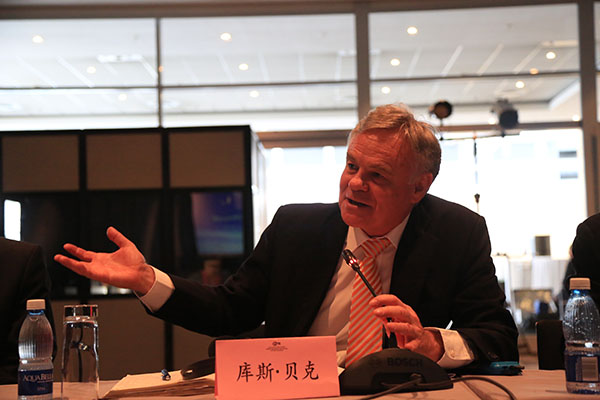 |
|
Koos Bekker, chairman of Internet and media company Naspers, sees a bright future. [Photo/chinadaily.com.cn] |
Chinese culture will gain popularity in Africa with greater economic interaction between the two, creating a market for Chinese media content throughout the African continent, said the chairman of global Internet and media company Naspers.
Koos Bekker of the South African-based conglomerate also said his company will invest more in meeting the need of Africans by bringing in more Chinese programs.
Naspers is currently, beaming 11 Chinese channels into Africa and he said the company "will carry more in the future and would like to make more programs together with China".
The programs have two types of audience: homesick Chinese and Africans wishing to pick up some Chinese to aid communication. He said the second group is growing "simply because people interact more with China in a business scene. "They feel the need to learn the language and learn a little bit about the culture."
"I see in all of Africa, China must have closer cooperation in future," he said, "As you start doing business together, you start getting interest in cultural staff."
"It's a common phenomenon of a country to come first as an economic power and after that the cultural influence," he said.
"I think our audience is interested in people they do business with in the long term," he said adding that people had begun to ask themselves "shouldn't I learn more about the culture?" while using made-in-China products and eating Chinese food.
The unbalanced coverage of China and the west needs to change, he said. "There are five pages of reports about Europe, and one page about China. The Chinese news is always economic news. That needs to change.
"We need to start to report on Chinese sports stars, Chinese movie stars, the social trends in China, as we do in the UK and the US. I think that phase is now starting. For me the biggest thing is just going beyond that we are business colleagues and becoming friends.
"It goes hand in hand, first business then friendship, then sort of human sympathy. As a media group, we have a particular responsibility to do that".
There are misconceptions between Chinese and Africans, but that will be broken down by more visit exchanges, he said. "Disease" and "flies flying over baby's faces" are often what Chinese think of about Africa, and the Chinese are often negatively perceived by Africans as "working machines. In both we have to break down the stereotype," he said.
He said he has found many Chinese who visited Cape Town "have a different view" about Africa "within a minute". "I think the first thing is to visit each other and the second thing is to make friends," he said.
Founded in 1915, Naspers is a multinational media group that provides services to more than 120 countries. Its principal business is Internet service, pay television and print media.
According to the company's website, it has around 1.3 billion Internet users across its platforms and those of its associates, more than 10 million households in 50 countries across sub-Saharan Africa who subscribe to its video entertainment services. It publishes 60 magazines and more than 90 newspapers in South Africa.
The company has been listed on the Johannesburg Stock Exchange since September 1994 and has an ADR listing on the London Stock Exchange.
According to media reports, MIH China (BVI) Limited, a subsidiary of Naspers Limited, owns 35.24 percent of Tencent Holdings Ltd, China's largest Internet firm by market value.